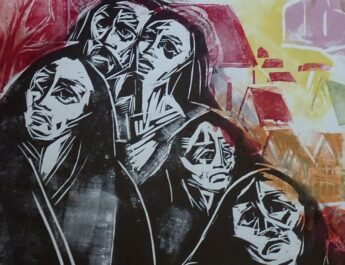Revelation 5:11-14
Eastertide C23
11 Then I looked,A and I heardB the voiceC of manyD angelsE
A “looked” = horao. To see, perceive, attend to, look upon, experience. Properly, to stare at and so implying clear discernment. This, by extension, would indicate attending to what was seen and learned. This is to see, often with a metaphorical sense. Can include inward spiritual seeing.
B “heard” = akouo. This is hear or listen, but it also means to understand by hearing. This is where the word “acoustics” comes from.
C “voice” = phone. Probably from phemi (to declare, say, use contrasts in speaking to shed light on one point of view); {from phao (to shine) or phaino (to bring light, cause to appear, shine, become visible or clear). This is a voice, sound, tone or noise. It can also be a language or dialect.
D “many” = polus. This is much, often, plenteous – a large number or a great extent.
E “angels” = aggelos. Probably from ago (to lead, bring, carry, guide) + agele (flock, herd, drove); {also from ago (see above)}. This is angel or messenger. Properly, it is one sent with news or to perform a specific task. This messenger can be human or an angel from heaven. More commonly, it is used for angels in the New Testament.
surroundingF the throneG and the living creaturesH and the elders;I
F “surrounding” = kuklo. 8x in NT. From kuklos (a circle). This is a ring, around, all around.
G “throne” = thronos. Probably from thanos (bench); from thrao (to sit). This is throne or seat – the place where the king sits. So, it is used figuratively to mean power, dominion, or a potentate. This is where the word “throne” comes from.
H “living creatures” = zoon. From zao (to live literally or figuratively). This is literally a thing that is alive. So, it is an animal or living creature.
I “elders” = presbuteros. From presbus (old man). This is an elder as one of the Sanhedrin and also in the Christian assembly in the early church.
they numberedJ myriadsK of myriads and thousandsL of thousands,
J “numbered” = eimi + ho + arithmos + autos. Literally, “their number was.” Eimi is to be or exist. Arithmos is 18x in NT. Perhaps from airo (raise, take up, lift, remove). This is a number or total.
K “myriads” = murias. 9x in NT. From murios (can mean a large number, countless; in the plural, ten thousand; its root may mean numerous). This is many thousands or a big number that cannot be counted. It is where the word “myriad” comes from.
L “thousands” = chilias. From chilioi (thousand; symbolically it has a sense of inclusiveness of every thing). This is thousand. Figuratively, it has the sense of totality.
12 singingM with fullN voice,
“WorthyO is the LambP that was slaughteredQ
M “singing” = lego. This is to speak, say, name, call, command. It is generally to convey verbally.
N “full” = megas. This is big in a literal or figurative sense – great, large, exceeding, abundant, high, mighty, perfect, strong, etc.
O “worthy” = axios. Related to “angels” in v11. From ago (see note E above). This is related to weight or worth – deserving, suitable, corresponding, due reward.
P “Lamb” = Arnion. Related to “numbered” in v11. From aren (sheep, male lamb); perhaps from the same as arren (male); perhaps from airo (see note J above). This is a lamb. In earlier usage this was a diminutive (i.e. a little lamb). At this point, it may have meant young lamb. Figuratively, it was someone pure or innocent.
Q “slaughtered” = sphazo. 10x in NT. This is to slay, butcher an animal to eat or for sacrifice, slaughter, maim through violence. In 1 John 3:12 it is used to describe Cain murdering Abel. All other uses are in Revelation.
to receiveR powerS and wealthT and wisdomU and mightV
R “receive” = lambano. It does not refer to passive receiving of something, but active acceptance or taking of something whether it is offered or simply nearby. It focuses on individual decision and action.
S “power” = dunamis. From dunamai (to be able, have power or ability). This is might, strength, physical power, efficacy, energy, and miraculous power. It is force literally or figuratively – the power of a miracle or the miracle itself.
T “wealth” = ploutos. Related to “many” in v11. From polus (see note D above) OR pleo (to sail, voyage); {probably from pluno (to plunge – so to wash); from pluo (to flow)} OR pletho (to fill, accomplish, supply; to fill to maximum capacity). This is abundance, wealth, or riches. It could refer to money/possessions or spiritual abundance. It can also be used for a valuable bestowment.
U “wisdom” = sophia. From sophos (wise, clever, skilled, learned, cultivated); related to saphes (clear). This is skill, wisdom, insight, intelligence, clarity. It is wisdom as applied through a practical skill or shrewdness. It is not thoughtfulness or the mere gaining of intelligence for its own sake. Sophia is wisdom in action for everyday living.
V “might” = ischus. 10x in NT. Perhaps from is (force) + echo (to have, hold, possess). This is strength, might, power, force, or ability. It is power that engages immediate resistance.
and honorW and gloryX and blessing!”Y
W “honor” = time. From tino (to pay, be punished, pay a penalty or fine because of a crime); from tio (to pay respect, value). This has to do with worth or something’s perceived value. Literally, it means price, but figuratively, it means the honor or value one sees in someone or something else. It can be esteem or dignity. It can also mean precious or valuables.
X “glory” = doxa. From dokeo (to have an opinion, seem, appear, suppose; a personal judgment; to think); from dokos (opinion). This is literally something that evokes a good opinion – something that connects to our understanding of intrinsic worth. The ultimate expression of this is, of course, God and God’s manifestation. So, this is opinion, honor, and dignity, but also praise, glory, renown, and worship.
Y “blessing” = eulogia. Related to “singing” in v12. 16x in NT. From eulogeo (speaking well of – speaking so that the other is benefited; praise, bless, thank, or call for a blessing); {from eu (good, well, well done, rightly) + logos (word, statement, speech, analogy; a word that carries an idea or expresses a thought, a saying; a person with a message or reasoning laid out in words; by implication, a topic, line of reasoning, or a motive; can be used for a divine utterance or as Word – Christ); {from lego (see note M above)}}. This is praise, blessing, commendation, benediction, benefit.
13 Then I heard everyZ creatureAA in heavenBB
Z “every” = pas. This is all or every.
AA “creature” = ktisma. 4x in NT. From ktizo (to build, create, form, shape; God’s acts of creation); probably akin to ktaomai (to get, purchase, possess). This is something that was created – a creature or product.
BB “heaven” = ouranos. May be related to oros (mountain, hill) with the notion of height. This is the air, the sky, the atmosphere, and heaven. It is the sky that is visible and the spiritual heaven where God dwells. Heaven implies happiness, power, and eternity.
and on earthCC and under the earth and in the sea,DD and allEE that is in them, singing,
“To the one seatedFF on the throne and to the Lamb
be blessing and honor and glory and mightGG
forever and ever!”HH
CC “earth” = ge. This is earth, land, soil, region, country, the inhabitants of an area.
DD “sea” = thalassa. Perhaps from hals (sea, salt, a boy of saltwater) or halas (salt; can be figurative for prudence). This is the sea, a lake, or seashore.
EE “all” = pas. Same as “every” in v13. See note Z above.
FF “seated” = kathemai. From kata (down, against, throughout, among) + hemai (to sit). This is to sit, be enthroned, or reside.
GG “might” = kratos. 12x in NT. This is strength, power, or dominion. It is vigor in a literal or figurative sense or power that is exercised.
HH “forever and ever” = eis + ho + aion + ho + aion. Literally, “to the ages of the ages.” Aion is from the same as aei (ever, always, unceasingly, perpetually; on every occasion). This is an age, cycle of time, course, continued duration. It is also used to describe the eternal or forever. This is the word used to discuss the present age or the messianic age.
14 And the fourII living creatures said, “Amen!”JJ And the elders fell downKK and worshiped.LL, MM
II “four” = tessares. This is four – used figuratively for total coverage.
JJ “Amen” = Amen. From Hebrew amen (verily, truly, amen, truth, so be it, faithfulness); from aman (to believe, endure, fulfill, confirm, support, be faithful, put one’s trust in, be steadfast. Figuratively, this is to be firm, steadfast, or faithful, trusting, believing, being permanent, morally solid). This word is literally firmness, but figuratively fidelity, faithfulness, honesty, responsibility, trust, truth, steadfastness. Properly, it is to be sure, certain, or firm. This is a word of emphasis indicating that something crucial follows.
KK “fell down” = pipto. This is to fall literally or figuratively.
LL “worshiped” = proskuneo. From pros (advantageous for, at, to, toward, with) + kuneo (to kiss); {may be related to kuno (dog)}. This is to do reverence, kneel, to prostrate oneself in homage, to worship.
MM Some manuscripts add “who live for the ages of the ages” = zao + eis + ho + aion + ho + aion. “Live” = zao. Related to “living creatures” in v11. See note H above.
Image credit: “Agnus Dei” by Cláudio Pastro at the Benedictine Monastery of Encontro in Parana, Brazil.




